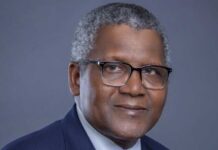This was according to a statement on Thursday by the Director of Public Relations and Information, Nigerian Air Force, Air Commodore Edward Gabkwet.
The CAS charged the pilots to justify the efforts and resources invested in their training by contributing their best towards sustaining the successes recorded in the various theatres of operation within the country.
Abubakar said that the NAF had continued to conduct independent and joint operations aimed at decimating the criminals and denying them freedom of action as well as shaping the operational environment in the various theatres.
He said the efforts could only be sustained with the injection of new and vibrant pilots to add energy and bite to the operations.
Abubakar said the new combat pilots were being injected at a time when NAF had immensely benefitted from the Federal Government’s determination to provide necessary platforms and equipment in the fight against terrorism, insurgency and other forms of criminality.
According to him, the acquisition of new platforms comes with the attendant consequences on manpower, training, and operating costs.
“This challenge is further exacerbated by the anticipated arrival of an array of new platforms such as the M-346, AH-1Z, A-109 Trekker, and the remaining T-129 ATAK helicopters.
“For NAF to bridge the manpower gaps currently experienced, a three-year training plan to commence from January 2024 must be sustained amid the availability of funding.
“It is in view of this projection that the graduation of the Basic Flying Course 20 is gladdening, as it serves to bridge the pilot deficiency gap,” The News Agency of Nigeria quoted him as saying.
The air chief further reminded the newly winged pilots of the current security environment, which, he said, had remained fluid and unpredictable due to threats posed by terrorists in the North as well as an upsurge in banditry and kidnapping activities across the country.
According to him, there still exist some threats to Nigeria’s unity and cohesion as posed by secessionist groups in the South-East, just as the theft of crude oil in the South-South has continued to threaten the economic well-being of the country.
He reminded the pilots to be aware that the journey was far from over, hence the need to continually strive to elevate the NAF to greater heights.
Earlier, the Air Officer Commanding Air Training Command, AVM Nnamdi Ananaba, said the graduation represented the final phase of a series of training activities aimed at producing fully qualified pilots for the NAF.
























